News of the Week Top 5; May 6, 2015
News of the Week Top 5; April 29, 2015
1. Carmakers Want To Use Copyright Law To Make Working On Your Car Illegal
2. DVD Makers Say That You Don’t Really Own The DVDs You Bought… Thanks To Copyright
3. Competition Killer: Why the Copyright Term Extension For Sound Recordings Will Limit Consumer Choice and Increase Costs (Michael Geist)
4. Woman behind Pakistan’s first hackathon, Sabeen Mahmud, shot dead by unknown gunmen
5. Streaming Overtakes Live TV Among Consumer Viewing Preferences: Study
jon
News of the Week Top 5; April 22, 2015
News of the Week Top 5; April 15, 2015
1. Photos secretly taken of family through window are art, not invasion of privacy: court
2. Court Adds Much-Needed Element Of Malice To Nova Scotia’s Terrible Cyberbullying Law
3. EFF Successfully Challenges Key Claims in “Podcasting Patent”
4. Russia’s Internet censor reminds citizens that some memes are illegal
5. Apple and the Self-Surveillance State (Paul Krugman)
jon
News of the Week Top 5; April 8, 2015
1. The cost of silence: mass surveillance & self-censorship
3. The Internet of Kafkaesque Things (Jay Stanley)
4. How the DMCA’s Online Copyright Safe Harbor Failed (Eric Goldman)
jon
News of the Week Top 5; April 1, 2015
1. China Uses Unencrypted Websites to Hijack Browsers in GitHub Attack
2. Ellen Pao’s Statement On Losing The Kleiner Perkins Case: “The Battle Was Worth It”
3. How C-51 undermines privacy (Lisa M. Austin, Benjamin J. Goold, Avner Levin and Andrea Slane)
4. Facebook tracks logged-out users in ‘violation’ of EU law, study says
5. Bell censorship: the status quo can’t endure
jon
News of the Week Top 5; April 25, 2015
1. Bell’s Crull Banned CRTC Chair Blais From CTV News Coverage Following TalkTV Decision
2. The new authoritarianism (Sergi Guriev & Daniel Treisman)
3. Russia Will Deploy “Digital Fingerprinting” to Enforce Copyright Online
5. Plagiarize This: A reasonable Solution to Musical Copyright After “Blurred Lines”
jon
News of the Week Top 5; March 18, 2015
News of the Week Top 5; March 11, 2015
2. Raising the Broadcast White Flag: What Lies Behind Bell’s Radical Plan to Raise TV Fees, Block Content, Violate Net Neutrality & Fight Netflix (Michael Geist)
3. Free to Be You and Me? Copyright and Constraint (Rebecca Tushnet)
4. Federal Court finds meta tags do not infringe trademarks or copyright
5. Spanish Court Limits Scope Of EU’s Right To Be Forgotten
jon
News of the Week Top 5; March 4, 2015
News of the Week Top 5; February 25, 2015
Power Rangers & Fair Use
Some of you may have seen the “grimdark” Power Rangers fan film that has been circulating around the internet lately. It was produced by Adi Shankar, who has produced similar fan films involving copyrighted characters like Venom or The Punisher in the past. The underlying legal justification for doing so is fair use, but as this article from Polygon describes, the fact that these are fan films made with no expectation of profit may not be sufficient for the fair use exception to apply. Such films offer an interesting test case for the current scope of fair use in the USA, and hypothetically in Canada as well. A pullquote for you:
So the question is whether the Power Rangers short is providing any commentary or parody. The interesting wrinkle is that people online can’t seem to decide whether the director was poking fun at hyper-dark takes on kiddie subject matter, or being serious. Is this a story in the world of the Power Rangers, or is it making fun of the idea of an ultra-dark Power Rangers story?
“That is as much in the gray area as I could give as an example. One could view this as commentary, taking a broad view of this, you’re taking a kid’s cartoon and making it a much darker short, and you could say well, that’s commentary on the copyrighted work and the characters,” Newberg explained.
“The copyright owner could make a really decent argument as well that no, what you’re really doing is creating a new story with our copyrighted characters, and we are the ones who have the sole right to make derivative works.” While judges may decide issues of fair use if it’s clear cut, this is not one of those cases. It would likely go ahead to a jury.
“This is a law school exam-type question,” Newberg said.
Interesting, then, that the director of the short did not seem to speak to a lawyer before speaking to the press:
“What I really want to accomplish when you watch, is you should really take it seriously. There’s nothing playful except for maybe the Hip-Hop-Kido thing. Maybe a few little like motivational character [things], interactions and stuff. Overall, it’s a very serious thing,” Kahn said in an interview with HitFix.
Or perhaps they did, and this is just another example of the widening chasms between the law, technology and social norms in the digital space:
“The joke isn’t that you’re laughing at each particular scene; the joke is that we did this ‘fuck you’ thing in the first place. You’re going to look at it and you go wow I can’t believe they fucking did that.”
News of the Week Top 5; February 18, 2015
News of the Week Top 5; February 11, 2015
1. An Open Letter to Prime Minister Cameron: 20th-century solutions won’t help 21st-century surveillance (Jonathan Zittrain)
3. Left Shark Bites Back: 3D Printer Sculptor Hires Lawyer To Respond To Katy Perry’s Bogus Takedown
4. Coding Creativity: Copyright and the Artificially Intelligent Author (Annemarie Bridy)
5. Labels, not Spotify, are (hurting) artists and breaking the music industry. Here’s how to fix it.
jon
News of the Week Top 5; February 4, 2015
Copyright term extensions might be coming to Canada
This jumps off our discussions from last week. According to this post by Michael Geist, a law professor at the University of Ottawa and one of the foremost Canadian experts in this area, it looks as though Canada may be considering extending its copyright terms as part of its negotiations in the Trans-Pacific Partnership Treaty (TPP):
“If new reports out of Japan are correct, however, Canada may have caved to U.S. pressure to extend copyright term. The U.S. extended its term to life plus 70 years in 1998 in response to demands from the Disney Corporation (Mickey was headed to the public domain) and has since pressured other countries to match. NHK reports that a deal on copyright term has been reached within the TPP with countries agreeing to a life plus 70 term. Alongside Japan, Malaysia, New Zealand, and Vietnam (the TPP countries that adhere to the Berne standard), it appears that Canada has dropped its opposition to the change.”
Geist flags some interesting research by the EFF that suggests that on the whole, copyright term extensions cost consumers millions in extra royalties. My hunch is that these additional profits largely accrue to large multinational media conglomerates, since the author is, by definition, dead during those additional twenty years. This is, to my mind, textbook rent-seeking. What is rent-seeking, you may ask? I’m partial to the Economist’s definition: “cutting yourself a bigger slice of the cake without making the cake bigger.” Or, to mangle the metaphor, getting cake sent to you for an additional 20 years because of work done by a dead person at least 50 years ago.
News of the Week Top 5; January 28, 2015
News of the Week Top 5; January 21, 2015
News of the Week Top 5; January 14, 2015
1. ‘Anonymous’ Member Calls For Revenge On Terrorists For Charlie Hebdo Massacre
2. Code Is Law: But law is increasingly determining the ethics of code. (Jonathon Penney)
3. Stop sketching, little girl — those paintings are copyrighted!
4. Rightscorp and BMG Exploiting Copyright Notice-and-Notice System: Citing False Legal Information in Payment Demands (Michael Geist)
5. Copyright and Inequality (Lea Shaver)
jon
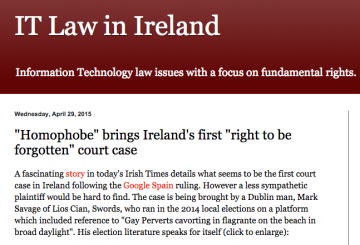
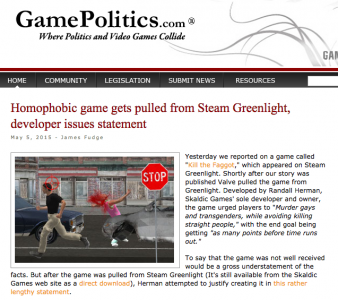

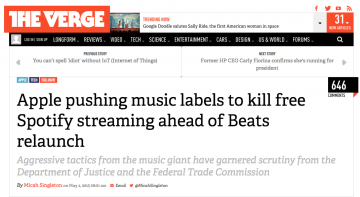
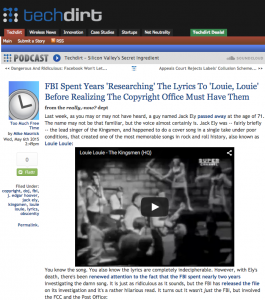
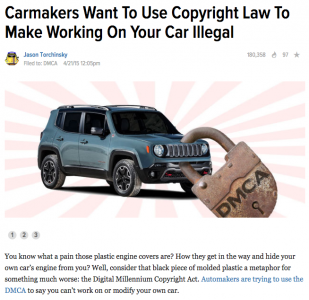
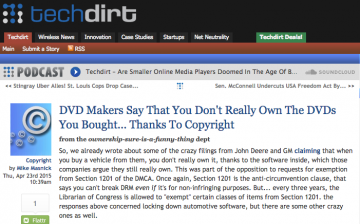
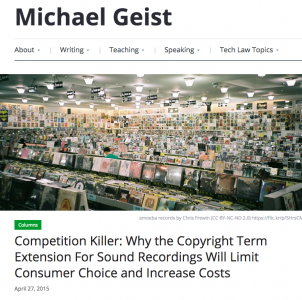

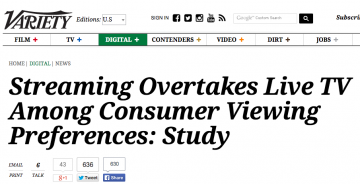
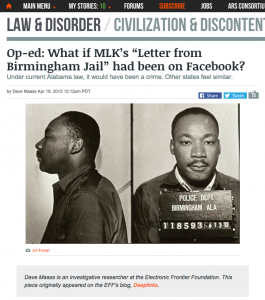
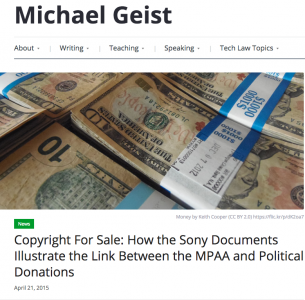
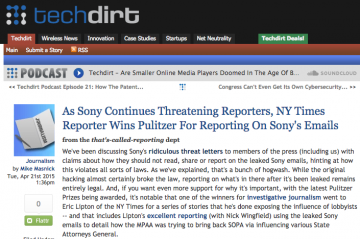

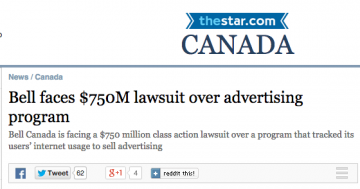
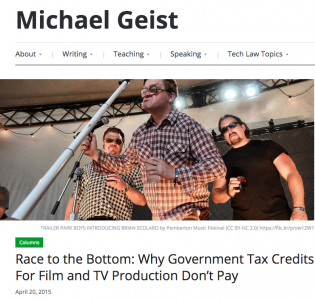

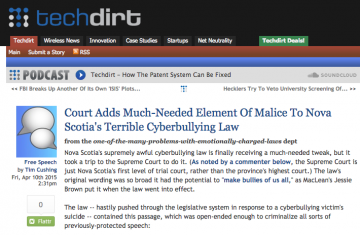
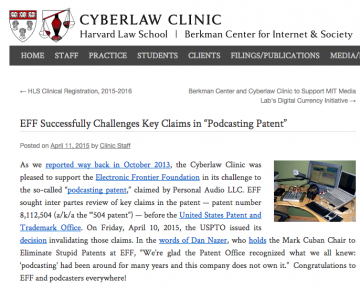
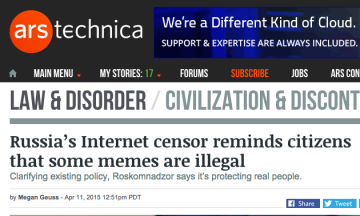
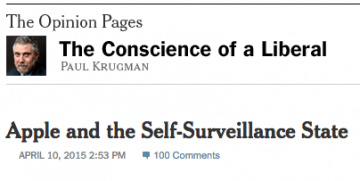
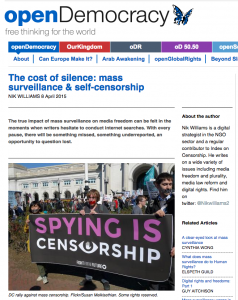
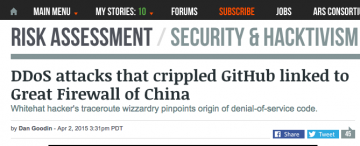
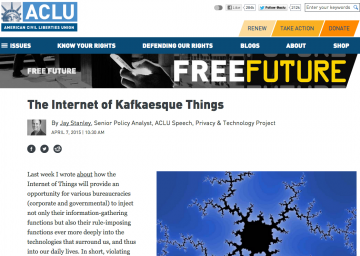
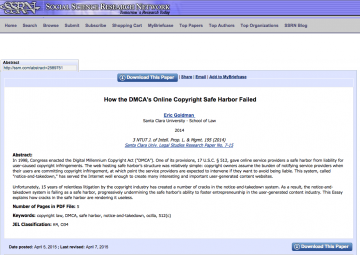
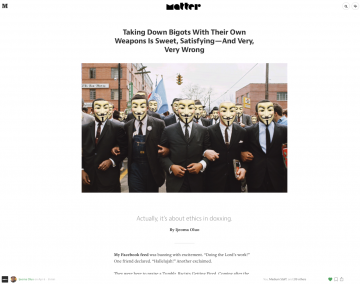
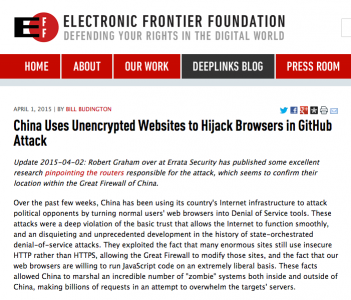
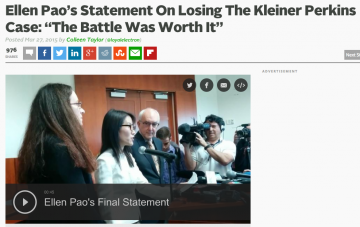
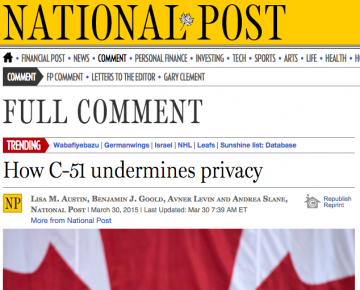
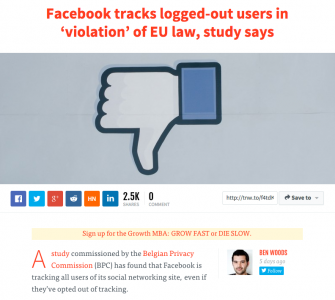
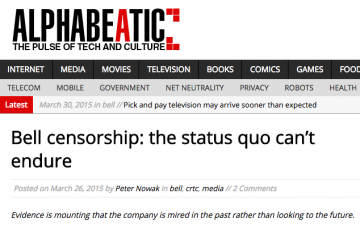
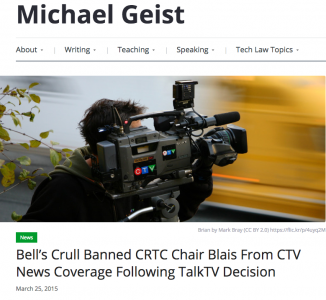
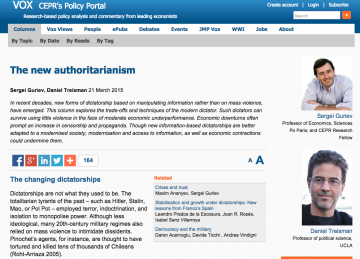

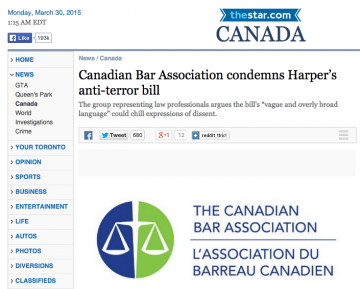
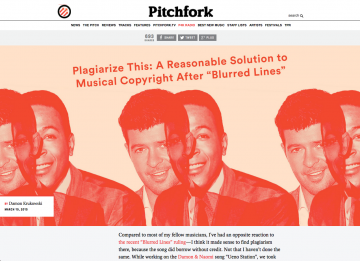
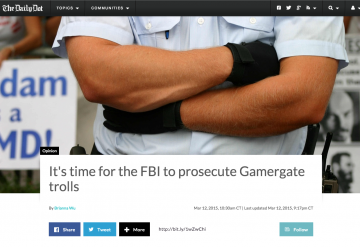

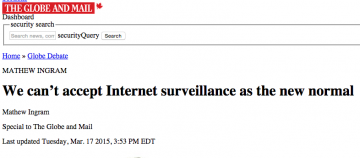
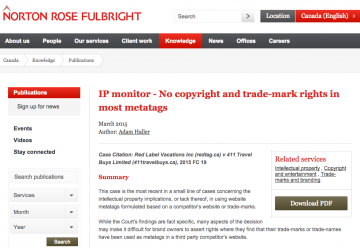
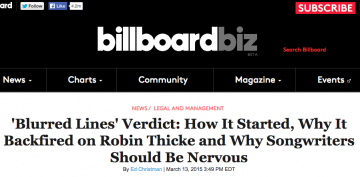
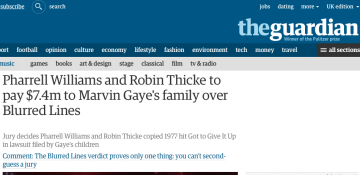
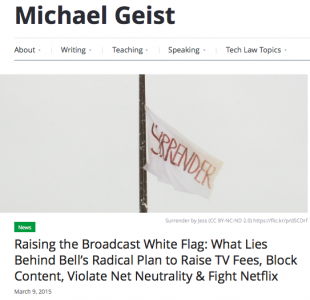
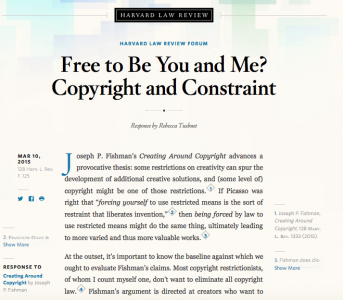
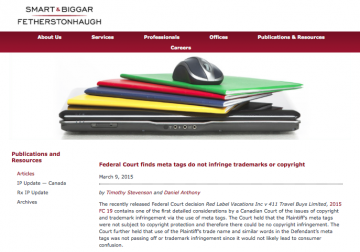
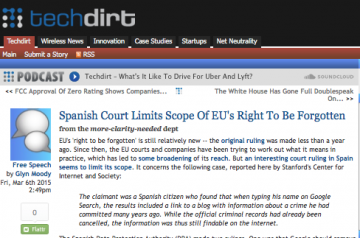
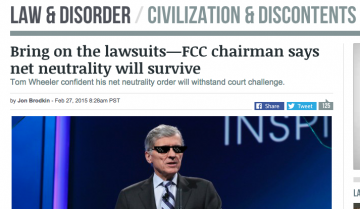
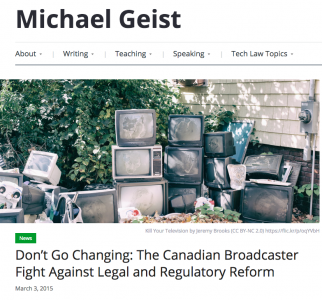

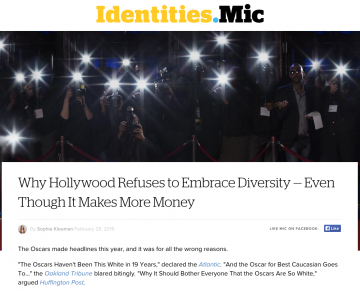


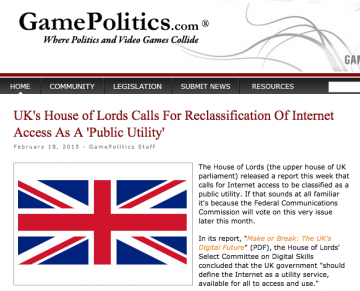
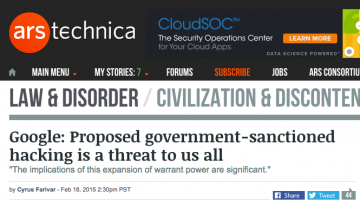
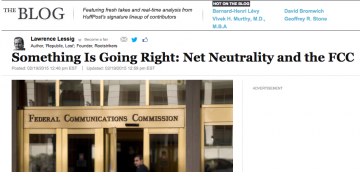


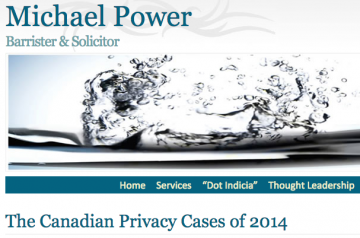

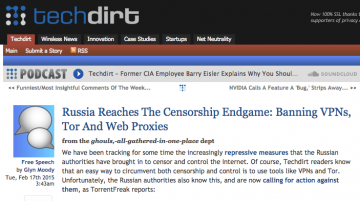

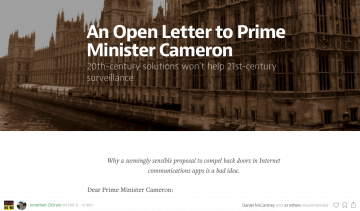

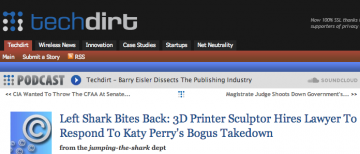
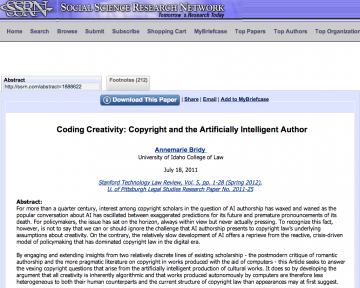


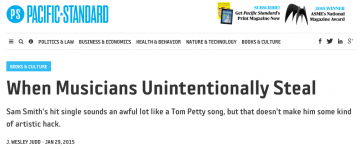


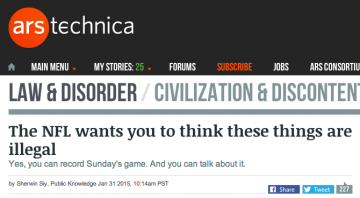
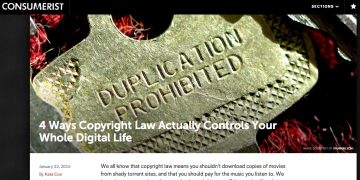

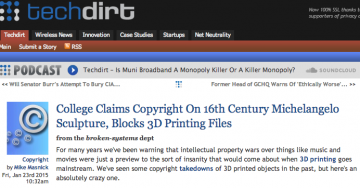
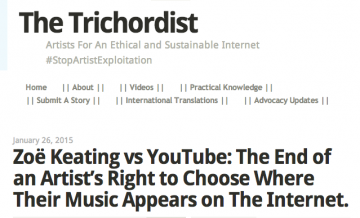
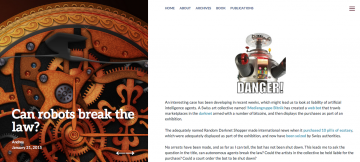

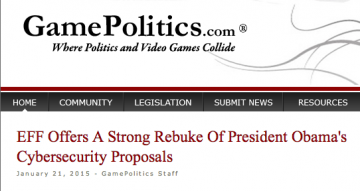
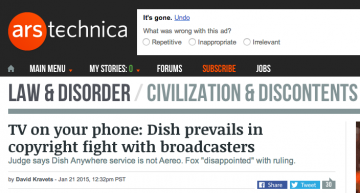
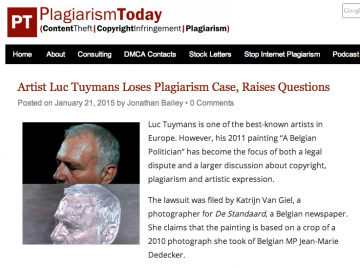
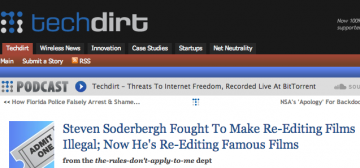

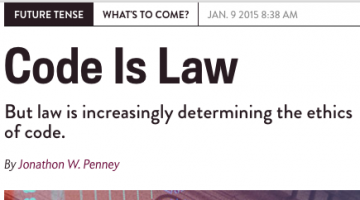

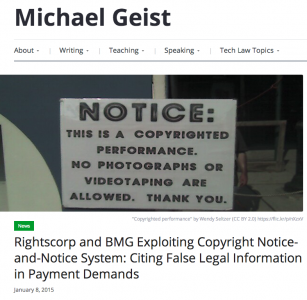
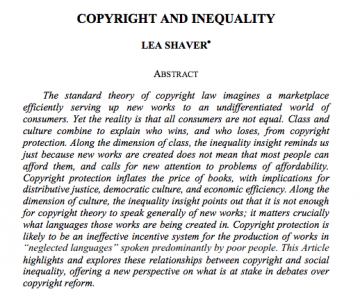

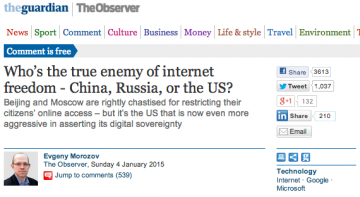

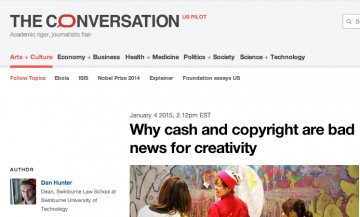
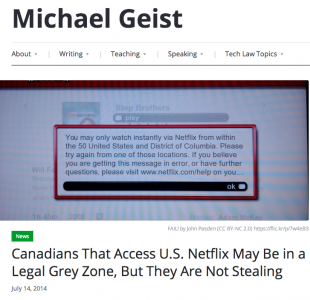
 Check out the UBC VideoGame Course
Check out the UBC VideoGame Course